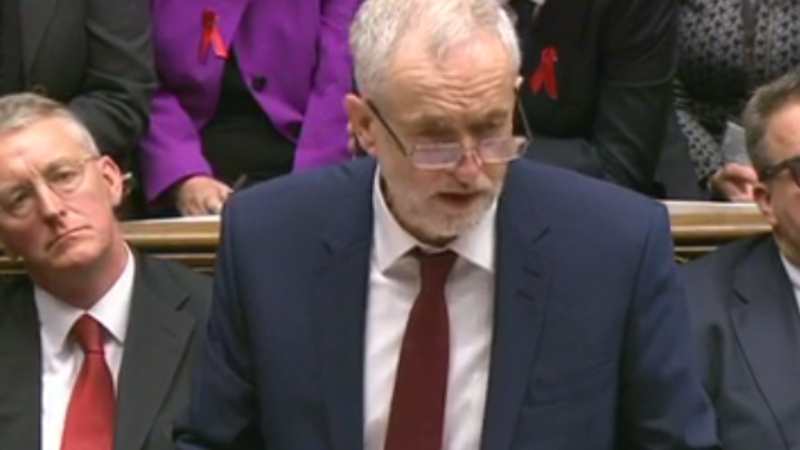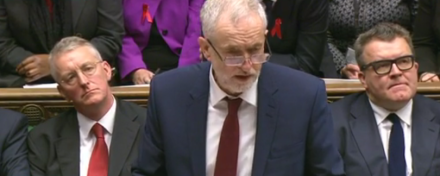

Mr Speaker,
The whole House recognises that decisions to send British forces to war are the most serious, solemn and morally challenging of any that we have to take as members of parliament.
The motion brought to the House today by the government authorising military action in Syria against Isil faces us with such a decision.
It is one with potentially far-reaching consequences for us all, here in Britain, as well as for the people of Syria and the wider Middle East.
For all members, taking a decision that will put British service men and women in harm’s way and almost inevitably lead to the deaths of innocents is a heavy responsibility.
It must be treated with the utmost seriousness – and respect given to those who make a different judgement about the right course of action to take.
Which is why the Prime Minister’s attempt to brand those who plan to vote against the government as “terrorist sympathisers” both demeans the office of the Prime Minister and undermines the seriousness of the deliberations we are having today.
Since the Prime Minister first made his case for extending UK bombing to Syria in the House last week, the doubts and unanswered questions then expressed on both sides of the House have only grown and multiplied.
That’s why it is a matter of such concern that the government has decided to push this vote through parliament today.
It would have been far better to allow a full two-day debate that would have given all members the chance to make a proper contribution.
It is impossible to avoid the conclusion that the Prime Minister understands public opposition to his ill thought-out rush to war is growing – and wants to hold the vote before it slips from his hands.
Whether it’s the lack of a strategy worth the name the absence of credible ground troops the missing diplomatic plan for a Syrian settlement the failure to address the impact on the terrorist threat or the refugee crisis and civilian casualties: it’s become increasingly clear that the Prime Minister’s proposal for military action simply doesn’t stack up.
Last week the Prime Minister focused his case for bombing in Syria on the critical tests set by the respected cross-party Foreign Affairs select committee.
Given the holes in the government’s case, it’s scarcely surprising that last night the committee reported that the Prime Minister had not “adequately addressed” their concerns.
In other words, the committee judged that the Prime Minister’s case for bombing has failed its tests.
After the despicable and horrific attacks in Paris last month, the question of whether the government’s proposal for military action in Syria strengthens – or undermines – our own national security must be at the centre of our deliberations.
There is no doubt that the so-called Islamic state group has imposed a reign of sectarian and inhuman terror in Iraq, Syria and Libya. And there is no question that it also poses a threat to our own people.
The issue is now whether extending UK bombing from Iraq to Syria is likely to reduce, or increase, that threat in Britain – and whether it will counter, or spread, the terror campaign Isil is waging across the Middle East.
The answers don’t make the case for the government’s motion. On the contrary, they are a warning to step back and vote against yet another ill-fated twist in the never-ending war on terror.
Start with the military dimension. The Prime Minister has been unable to explain why extending air strikes to Syria will make a significant military impact on the existing campaign.
Isil is already being bombed in Syria or Iraq by the US, France, Britain, Russia and other powers.
During more than a year of bombing Isil has expanded, as well as lost, territory. Those Isil gains include the Iraqi city of Ramadi and the Syrian city of Palmyra.
The claim that superior British missiles will make the difference is hard to credit when the US and other states are struggling to find suitable targets. In other words, extending UK bombing is highly unlikely to work.
Second, the Prime Minister has failed to convince almost anyone that – even if British participation in the air campaign were to tip the balance – there are credible ground forces able to take back territory now held by Isil.
In fact, it’s quite clear there are no such forces.
Last week, the Prime Minister suggested that Kurdish militias or the Free Syrian Army would be able to fill the gap. He even claimed a 70,000-strong force of moderate FSA fighters was ready to coordinate action against Isil with the western air campaign.
That claim has not remotely stood up to scrutiny. Kurdish forces will be of little assistance in the Sunni Arab areas Isil controls. Nor will the FSA, which includes a wide range of groups few would regard as moderate – and mostly operates in other parts of the country.
The only ground forces able to take advantage of a successful anti-Isil air campaign are much stronger jihadist and Salafist groups close to Isil-controlled areas.
That’s what the Prime Minister’s bombing campaign could well lead to.
It’s why the logic of an extended air campaign is mission creep and western boots on the ground – whatever the Prime Minister may say now …. about keeping British combat troops out of the fight.
Third, the military aim of attacking Isis targets in Syria is not part of a coherent diplomatic strategy.
UN security council resolution 2249 passed after the Paris atrocities and cited in today’s government motion does not give clear and unambiguous authorisation for UK bombing in Syria.
To do so it would have had to be passed under Chapter 7 of the UN Charter to which the security council couldn’t agree.
The UN resolution is certainly a welcome framework for joint action to cut off funding, oil revenues and arms supplies from Isil. But there’s little sign of that happening in earnest.
Nor is there yet any serious evidence that it’s being used to coordinate international military or diplomatic strategy in Syria.
That’s despite the clear risk of potentially disastrous incidents such as the shooting down of a Russian military aircraft by Turkish forces leading to a dangerous escalation.
Fourth, The Prime Minister has avoided spelling out to the British people the warnings he has surely been given about the likely impact of UK air strikes in Syria on the threat of terrorist attacks in the UK.
That is something all those backing the government’s motion should weigh heavily when they vote to send RAF pilots into action over Syria.
It is critically important, Mr Speaker, that we are honest with the British people about the potential consequences of the action the Prime Minister is proposing today.
I’m aware that there are those with military experience, including members on the benches opposite, who have argued that extending UK bombing will – and I quote – “increase the short-term risks of terrorist attacks in Britain.”
We should also remember the impact on communities here in Britain. Since the Paris attacks there has been a sharp increase in Islamophobic incidents and physical attacks.
The message must go out from all of us in the House: we will not tolerate any form of anti-Semitism, Islamophobia or racism in our country.
And the Prime Minister has offered no serious assessment of the impact of an intensified air campaign on civilian casualties in Isil-held Syrian territory or the wider Syrian refugee crisis.
At least 250,000 have already been killed in Syria’s terrible civil war 11 million made homeless and four million forced to leave the country.
Many more have been killed by the Assad regime than by Isil itself.
Yet more bombing in Syria will kill innocent civilians of that there’s no doubt and turn many more Syrians into refugees.
Yesterday I was sent this message from a Syrian constituent of mine.
“I’m a Syrian from Manbij city, which is now controlled by Isil”, he writes. “Members of my family still live there and Isil didn’t kill them. My question to David Cameron is: ‘Can you guarantee the safety of my family when your air forces bomb my city?’”
And there is no EU-wide strategy to provide humanitarian assistance to those victims. You can’t back more bombing without a plan to pick up the pieces.
Finally, and perhaps most important of all the Prime Minister is still entirely unable to explain how UK bombing in Syria would contribute to a comprehensive negotiated political settlement of the Syrian war.
Such a settlement is widely accepted to be the only way to ensure the isolation and defeat of Isil in the country.
Isil grew out of the invasion of Iraq. But it has flourished in Syria in the chaos and horror of a multi-front civil war.
And the government’s bombing proposal clearly does not subordinate military action to international diplomatic efforts.
The Prime Minister’s approach is bomb first, talk later.
Instead of adding British bombs to the others now raining down on Syria, what’s needed is an acceleration of the peace talks in Vienna.
Those negotiations need to involve all the main regional and international powers with the aim of establishing a broad-based government in Syria that has the support of the majority of its people.
In the context of such a settlement internationally backed regional forces could help to take back territory from Isil. But its lasting defeat in Syria can only be secured by Syrians themselves.
The government’s proposal for military action in Syria is not backed by clear and unambiguous authorisation by the UN. It does not meet the seven tests set by the Foreign Affairs Select Committee.
And it does not fulfil three out of four conditions laid down in Labour’s conference resolution passed two months ago.
In the past week, we have given a voice to the growing opposition to the government’s bombing plans – across the country, in parliament and the Labour party.
And the rejection of fourteen years of disastrous wars in the wider Middle East was a central pillar of the platform on which I was elected Labour leader.
In the light of that record of western military interventions, UK bombing of Syria risks yet more of what President Obama called “unintended consequences”.
The spectre of Iraq, Afghanistan and Libya looms over this debate.
To oppose another reckless and half-baked intervention isn’t pacifism. It’s hard-headed common sense.
To resist Isil’s determination to draw the western powers back into the heart of the Middle East isn’t to turn our backs on allies.
It’s to refuse to play into the hands of Isil.
It’s wrong for us here in Westminster to see a problem, pass a motion and drop the bombs pretending we’re doing something to solve it.
That’s what we did in Afghanistan, Iraq and Libya. Has terrorism increased or decreased as a result?
The Prime Minister said he was looking to build a consensus around the military action he wants to take.
He has achieved nothing of the kind.
He has failed to make the case for another bombing campaign. All our efforts should instead go into bringing the Syrian civil war to an end.
After Iraq, Afghanistan and Libya, members thinking of voting for bombing should keep in mind how terrible the consequences can be.
Only a negotiated peace settlement can overcome the Isil threat in Syria. And that should be our overriding goal.




More from LabourList
‘Cutting Welsh university funding would be economic vandalism, not reform’
Sadiq Khan signals he will stand for a fourth term as London Mayor
Starmer or Sarwar: Scottish Labour MSPs and MPs split over Keir Starmer’s future